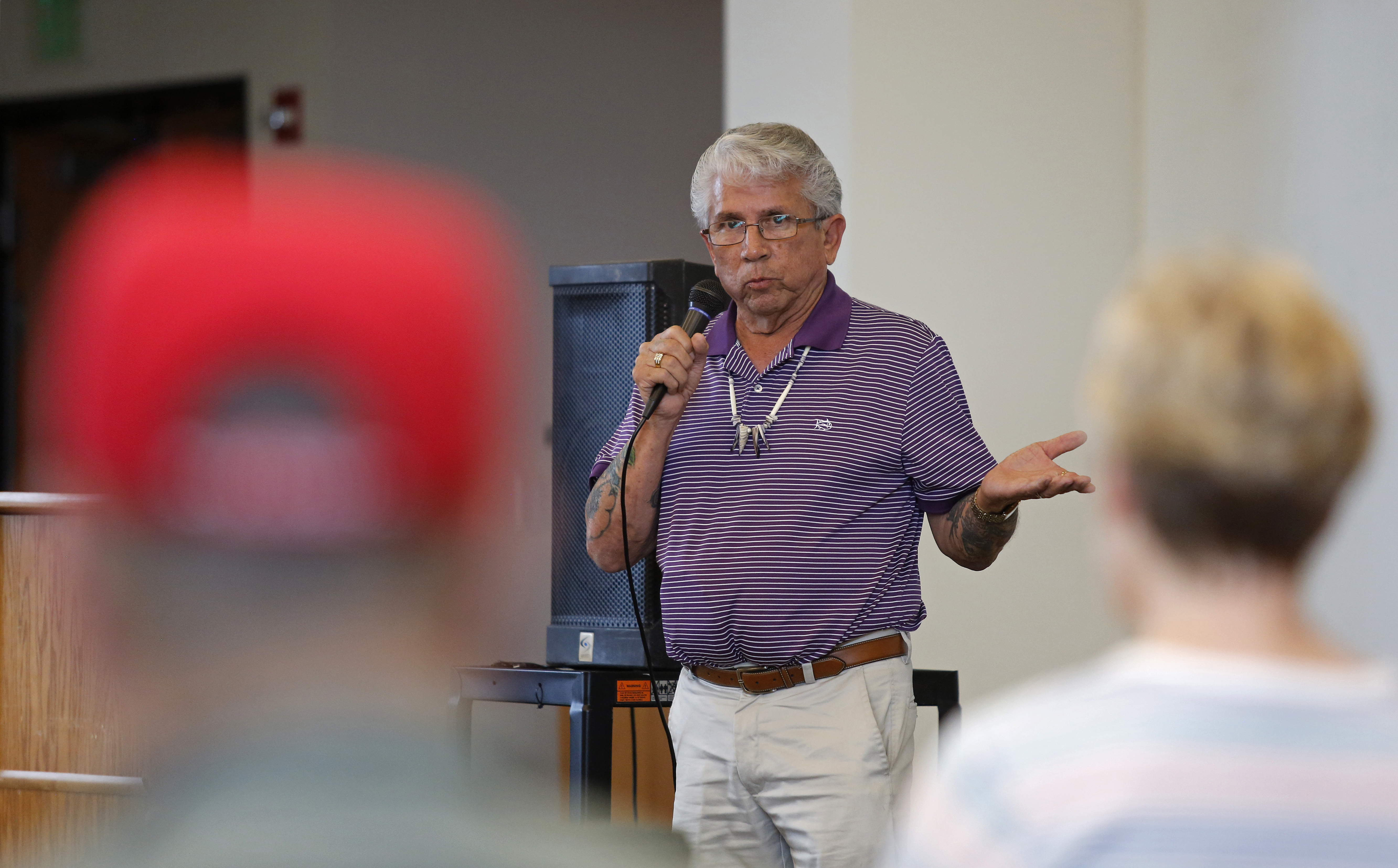Tribal Government & News
Bobb speaks to McMinnville veterans about Tribe, military commitment

By Danielle Harrison
Smoke Signals staff writer
McMINNVILLE -- Despite having their ancestral lands stolen and being forced to live on desolate and sometimes remote Reservations, Native Americans continue to serve their country in the largest percentages per capita of any ethnic group.
This commitment, along with the history of the Grand Ronde Tribe in Oregon, was the focus of Tribal Council member and Vietnam-era Marine Corps veteran Steve Bobb Sr.’s speech during a Thursday, July 1, event to the McMinnville chapter of the Band of Brothers veterans group at Evergreen Aviation Museum. The group is open to all veterans.
Bobb was originally scheduled to speak about the Tribe and Native Americans’ military service in April 2020, but it was postponed more than a year due to the COVID-19 pandemic. Approximately 21 people attended the event, which was one of the first in-person meetings for the group since the pandemic began.
“Until 200 years ago, we were living in peace, going about the daily business of surviving the elements,” Bobb said. “Then, the Oregon Territory was opened up to the white settlers with total disregard for the Indigenous people who occupied the lands for 10,000 years. … With the advent of the white settler into the farmland of the Willamette Valley, and the overwhelming dominance of the U.S. Cavalry, my ancestral leaders were forced to the table to cede lands to the Unites States government in the form of treaties.
“We signed seven in all, and traded our lands for health care, education and housing. We negotiated in good faith, but the government never honored any treaty with any Tribe in Oregon.”
Bobb recalled how Tribal members were forced by federal troops to march almost 270 miles in the winter of 1856 from their temporary reservation at Table Rocks near Medford to the 60,000-acre Grand Ronde Reservation. The journey is referred to as the Oregon Trail of Tears.
“Joel Palmer was the Indian agent who was supposed to care for the Indians while he cheated them out of everything,” Bobb said. “That was his job. But in time, Grand Ronde transitioned into a logging area and a positive place to live, where we still had our cultural practices and language. Then came the Western Oregon Termination Act of 1954. It terminated all trust responsibilities from the U.S. government to the Tribes west of the Cascades because that land had become valuable with old growth timber.”
Bobb explained how after Termination, Tribal members scattered over the United States.
“But we were always Grand Ronde Indians, regardless of what the government told us we were going to be,” he said. “But we suffered adversity and prejudice along the way.”
Bobb then touched on the Tribe’s Restoration in 1983, getting emotional as he did so.
“President Ronald Reagan signed the Grand Ronde Restoration Act, which re-recognized us as Grand Ronde people again. There was so much work our people did to get to that point. … Now, we thank Creator every day for our blessings. Spirit Mountain Casino has done very well. We have services for health care, education and housing. Six percent of the revenues from the casino go back to people in the community.”
Despite Native Americans’ terrible past experiences with the United States government, they still continue to serve in the military and defend a nation that was once taken from them. Bobb explained why from his perspective.
“Creator put us here with the intent to share the land, not for man to dominate and take what was not intended for them to have,” Bobb said. “We will protect this beautiful nation that was intended for us. If we were called today, we wouldn’t hesitate. The nation is still ours and we still want to share the wealth. We are all a family of God and we believe everything has a spirit and a purpose. … You’ll never see us out destroying other people’s property but you will see us come out when the environment is about to be destroyed, even more than it has been already.”
Bobb also discussed misconceptions about Native Americans that persist in today’s society.
“Until recently, there was no teaching in schools about Native Americans (in the present) and how Tribal cultures are still alive today,” he said. “They are working on that, though, so people will learn more about the First Peoples who lived here and continue to live here.”
Bobb added that most knowledge of Tribal people is limited to what he called “The John Wayne Indian.”
“The Indian was always the renegade, the savage, the bad person,” he said. “That’s what was depicted in most movies when it was really the other way around.”
He added that Native Americans are also the only minority group with sports teams named after them, which often included demeaning names such as “Redskins.” Bobb noted that some of that is beginning to change, along with the use of the word “squaw” for names ranging from creeks to geographical locations.
“For Native Americans, you got to be positive and move forward,” Bobb said. “You’re not going to be able to change what has already happened. Our world is in turmoil. We have to work together and stay together. Everyone in this nation is one family.”
